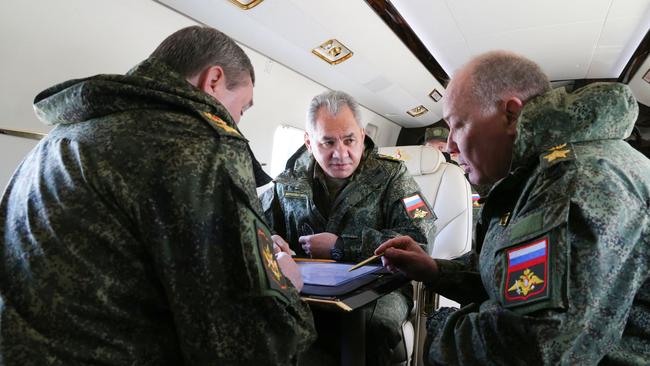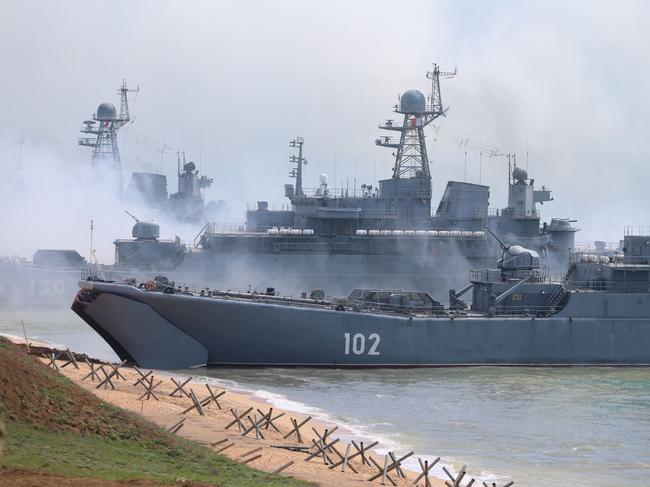Russia-China union casts dark cloud over West

First, let us examine the size and preparedness of Russia’s military deployment. Defence Minister Sergei Shoigu has overseen drills involving more than 10,000 troops and 40 warships in Crimea and the Black Sea. But that is far from the full story. Between 80,000 and 100,000 troops from the southern and western military districts of Russia have been deployed on “military drills” along the borders of Ukraine.
This large-scale build-up led to concern in Kiev of a repeat of Russia’s attack in 2014, when Moscow annexed Crimea. General Shoigu has described the deployment of Russian troops as “a snap test of combat readiness” in response to threatening military activities by NATO. He said Moscow was closely watching NATO activity, including the current Defender Europe 2021 exercises from the Baltic to the Black Sea. He announced that Moscow intends to close parts of the Black Sea to foreign military and other ships for the next six months.
The Russian troops included 48 battalion groups of tanks, mechanised and artillery elements, as well as airborne assault divisions and amphibious attack units. They have been deployed with military field hospitals clearly visible by commercial satellite photography. Field hospitals are particularly important because of their preparedness for battle casualties. There is also sufficient air power deployed, including attack helicopters, ground attack and fighter aircraft, to establish air superiority over the battlefield and support the ground troops.
Second, we turn to the harsh language used by Putin to defend this sudden, threatening display of military force. Last Wednesday, in his annual State of the Nation address, he accused other nations of unfairly targeting Russia and cautioned against crossing what he called “a red line” and “if anyone mistakes our good intentions for indifference or weakness … they should know Russia will respond asymmetrically, swiftly and harshly”. He went on to say the organisers of any provocations that threaten Russia’s core interests would “regret what they have done more than they have regretted anything for a long time”. He said Russia was simply taking precautions, given the dangerous and unpredictable situation on its borders with Ukraine.

Putin used the occasion to remind foreign leaders of Russia’s military and nuclear might and its “moral superiority” over the West. Putin said Russia’s history was a constant fight against interference from outside nations that, in recent years, had made a new sport of punishing Russia for its apparent transgressions. He asserted that Russia has a “a different genetic, cultural and moral code” to the West.
So, what is Moscow trying to do here? My view is that Putin is seeking to bully and coerce Kiev into obedience as essentially a vassal state. But there is also a message to the new Biden administration: if you continue to support the regime in Kiev, including with military assistance and holding out the prospect of Ukraine joining NATO, then Moscow will respond. Putin is warning Joe Biden not to confirm NATO membership on Ukraine. Were that to occur, Putin would be prepared to go to war. He has warned that a Ukrainian offensive in the Donbas against the Russian separatists (where there are more than 400,000 Russian passport holders) “would spell the end of Ukrainian statehood”.
Finally, how far do we think Russia-China strategic co-operation might go? Zbigniew Brzezinski, a former national security adviser to president Jimmy Carter, once warned that a strategic union of Moscow and Beijing would pose the biggest geopolitical threat the US has ever experienced. It is true Moscow and Beijing do not yet have a formal alliance, but they are becoming increasingly close and share a fundamental strategic relationship. They have the same geopolitical view of a decadent, decaying West led by the US and of their own superior moral and cultural values. The two presidents have a strong personal relationship. Moreover, Russia and China are increasingly operating together militarily including in large-scale military exercises and joint operations in places like the Baltic Sea and East China Sea. And Russia is increasingly supplying advanced military equipment to China, including the construction of a ballistic missile early warning radar.
The key question is under what conditions might China and Russia co-ordinate their military actions against the West? Beijing and Moscow both understand Washington can no longer handle two major regional wars concurrently: today’s US policy is to confront one major war and mount a holding operation elsewhere. And what precisely would such a holding operation mean for Taiwan if the US were to be otherwise involved with its NATO allies against Russia?
Paul Dibb is emeritus professor of strategic studies at the ANU. He is a former deputy secretary of defence, director of the joint intelligence organisation, and head of the national assessment staff.



In the past couple of weeks, Russia has deployed a large, battle-ready military force on the borders of Ukraine. Elements of that force have now been returned to barracks, but the threat of a Russian attack on Ukraine can no longer be dismissed. Neither can the possibility of military co-ordination between China’s President Xi Jinping and President Vladimir Putin to demonstrate their rising military power compared with the relative decline of America.